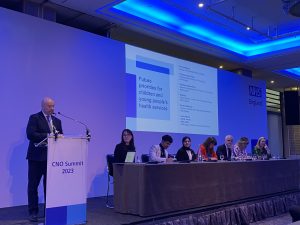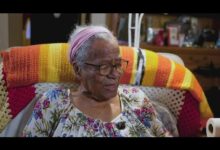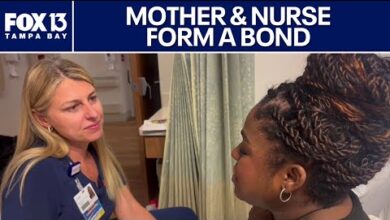Target for paediatric warning system to be national by April 2024

A new national system for identifying when a child’s health is deteriorating must be “rolled out and embedded everywhere”, nurse leaders have urged.
Nurses working with children and young people (CYP) discussed priorities for CYP services at the annual summit of chief nursing officer for England Dame Ruth May, being held in London this week.
The new Paediatric Early Warning System (PEWS) was at the centre of the panel discussions.
The system introduces a single, national process for monitoring child patients’ risk of deterioration.
Professor Simon Kenny, national clinical director for children and young people at NHS England, told the conference that the national PEWS had been informed by similar systems that already existed in individual trusts.
He said: “This is only a little bit of how we can improve safety for children, and the reason for doing this is that, if we have a single system it makes it much easier for us to teach it.
“It means that when staff move between institutions, they have the same language and they know instantly, whatever environment they’re in, what the score system means.”
The PEWS works by assigning a score to a young patient that represents the level of concern about their condition and their risk of deterioration.
“[We need] to see the paediatric early warning signs that we’ve spoken about really rolled out and embedded everywhere”
Phoebe Robinson
The score considers clinical markers like blood pressure, heart rate, oxygen levels and levels of consciousness, while also placing a greater emphasis on parental concerns.
Most importantly, if a parent or carer raises concerns that their child’s health is worsening, this will immediately escalate the patient’s care, regardless of other clinical observation.
The PEWS is similar to the National Early Warning System (NEWS) that already exists for adults.
Professor Kenny said that NHS England hoped to get the national PEWS implemented in most trusts by April 2024.
“It’s available in both paper and in digital formats,” he explained.
“Obviously we’re moving into a digital environment and it also means that we can actually start to collect a lot more data.”
The system is being implemented first in acute settings. Going forward, Professor Kenny said it was important to look at how PEWS can be expanded into other areas.
“The next step is to move into emergency departments, into ambulances and into primary care and community settings,” noted Professor Kenny.

Children and young people panel at the CNO Summit 2023
Phoebe Robinson, director of CYP and maternity at NHS England, echoed that PEWS needed to be expanded into different settings and rolled out across England.
“[We need] to see the paediatric early warning signs that we’ve spoken about really rolled out and embedded everywhere,” she said.
“The big priority and the big opportunity for us all, I think, is this work on primary [care] and community,” she added.
Another issue that was raised during the panel discussion was ensuring that NHS England’s wider patient commitments could actually be applied to babies and CYP.
In particular, Ms Robinson noted that the gap needed to be narrowed on elective care recovery between CYP and adult services.
“Unfortunately, children’s waiting lists are still growing at a faster rate than those for adults at the moment,” she explained.
Separately, Kate Pye, deputy director for CYP nursing at NHS England, highlighted the impact that the cost-of-living crisis was having on the care that can be given to CYP and their families.
She said: “Currently, we have four million children in this country living in poverty.
“When you add on [a] lengthy hospital stay, the financial burden for families can be enormous as well as the stress of being in hospital at the time.”
In autumn 2021, NHS England was approached by Sophie’s Legacy, a charity which was set up in memory of Sophie, who died of cancer in 2021 aged 10.
Sophie wanted certain things changed to improve the experience of CYP in hospitals, and the charity is trying to implement the changes.
One such change is for improvements to food for children in hospital, as well as for parents to be fed when staying in hospital with their child.
Ms Pye said NHS England had undertaken some “really successful” pilots in England which had given small amounts of money to children’s hospitals to give parents food vouchers or food.
“As a children’s nurse, you can’t do your job without parents, and we don’t want to do our job without parents” she explained.
“So what we need to make sure is that we’re keeping them well.”
Sophie’s Legacy now provides food for 30 wards across nine trusts in the South East of England.







